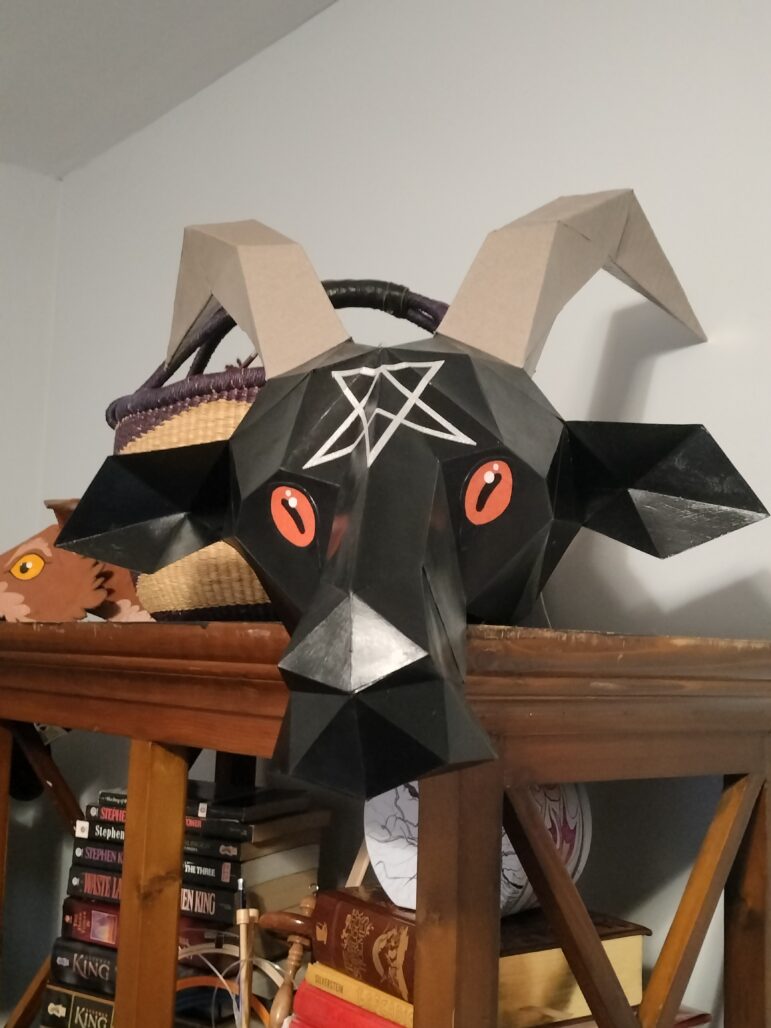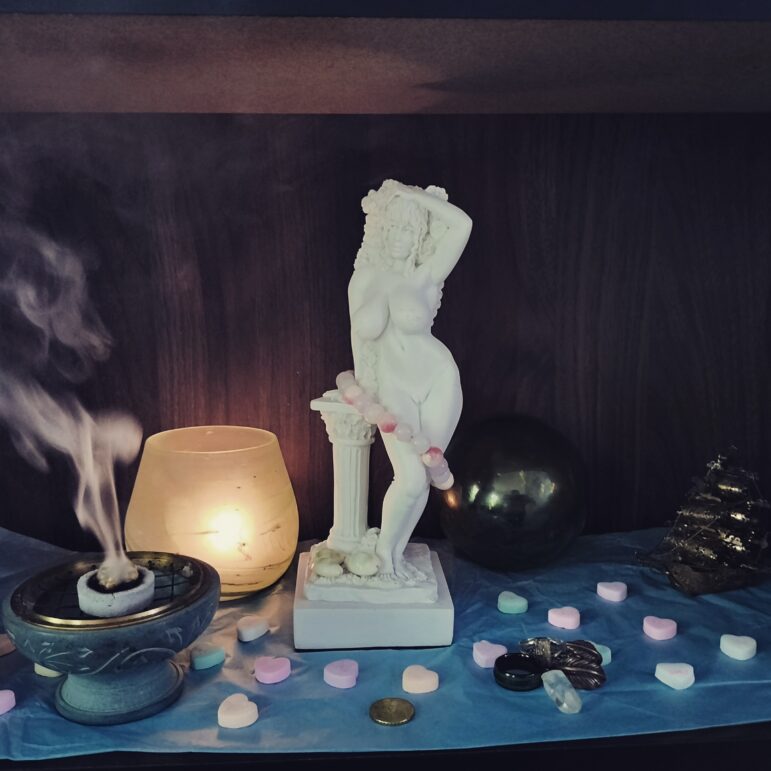
At first, I think it’ll be fine if I just move Baphomet.
He’s not a devotional piece – the few encounters I’ve had with that spirit have been fun, but not impactful – so it’s not a big deal, taking him down for a weekend. It might leave a strange hole in the decor, though. Since my friend moved away, the big craft-paper mask has been a staple in my living room, his pleasant goatish expression punctuated by red eyes and a white symbol on his forehead that looks like an inverted pentagram to a casual observer. He’s the first face to greet me when I get home, and I’ll miss him. But it’s only three days, and the space will be much more innocuous without him.
Innocuous, that is, except for Aphrodite. She’s much smaller, but hard to miss on the altar, where her pale plaster leaves nothing to the imagination. Destroying an altar is out of the question for me, especially one that represents such a new connection. Maybe I could repurpose some cloth and give her a stole that would make her slightly less exposed. It wouldn’t make much of a difference, but it would, perhaps, make her less remarkable.
My eyes shift around the room, trying to imagine what a newcomer might fixate on next. In discussing this with my friends I’ve joked that I’m so far from the mainstream I can’t even hear the water, and it’s never felt more true than now. This is the first place that has been entirely mine, where every piece of art or display has been chosen because it represents something important to me, something that makes me happy. Trying to see it with another set of eyes feels distancing, like a particularly unpleasant magic trick. I suppose that’s fitting.
If Aphrodite was veiled, would their attention turn to the small green candle in its corner, horns marking the well-dressed figure as a smooth-talking devil? Or would it be the caduceus, made for me by a partner out of taxidermied wings and freeze-dried snakes? Would they object to the print from my favorite tarot deck, two Lovers curled around each other in a passion that verges into bloody consumption? Or would they, still carrying the Protestant ideology of my childhood, simply object to the portrait of Mary Magdalene, with the Catholic depictions of the red veil and halo?
“Gods,” I mutter to myself. “It’s The Birdcage.”

The author’s Baphomet mask [L. Babb]
I was in middle school before I got a DVD player in my room. It was really a first-generation XBox, a gaming system so advanced past anything else my family had that I wasn’t even sure how to set it up. It wasn’t the best system I could have won at the lock-in the local Christian coffee house had hosted – I’ve often wondered what my gaming career would have looked like if I carried home a PS2 instead – but I was delighted. I brought it in, cleared off a chunk of my bookshelf, commandeered a small television that almost had the right hook-ups, and moved all of my movies to my room.
The movies at my house were collective, stored in the living room for the entertainment of a family with no cable access, but there was a small subset that was undoubtedly mine. I couldn’t bring myself to watch them except in the rare moments when I had the place to myself, and nobody else seemed interested in them, but I kept them on a set aside shelf with a protective jealousy that was almost draconic. I couldn’t have said why I loved them, or even what they had in common, and when I was watching them I felt as though I should be ashamed, somehow. “I just like musicals,” I told myself, as though that explained the list that grew through my high school years. Rent. The Rocky Horror Picture Show. Hedwig and the Angry Inch. Hair. Musicals. What else could they have in common?
With a DVD player of my own, the list got more daring. I brought home Quills, rented Fried Green Tomatoes from the library, sobbed over Boys Don’t Cry. In the privacy of my room, in the smallest of small towns in Kansas, parts of me that wouldn’t have names for themselves for years started to unfurl. In the moment, all I knew was that these movies were important to me in a nameless, bone-deep way.
One of the movies that I watched and rewatched in that time was The Birdcage, the Robin Williams and Nathan Lane vehicle about a gay couple that try to play straight to impress their son’s new in-laws. It was always billed as a comedy, but even then the story struck me as tragic. I watched as the two main characters, driven by their son’s shame and reprobation, drilled on how to dress, how to talk, how to hold their wrists to hide themselves.
The scenes felt almost violent, even then, forcing censure and pain into an otherwise loud and joyful household. I watched them strip their house of decoration and all but destroy their relationship to pretend to be something that they weren’t.
And then, despite all this, I watched them fail. The china was wrong, the cover story was faulty, the friends were too strange. They couldn’t truly hide who they were. That failure felt like a blessing, a relief, a benediction. Only when the characters were joyfully themselves could they build a relationship with their son and each other. Only then did they get their happy ending.
Now, standing in my kitchen, I remember that kid silently watching a bevy of attractive men take art off of fictional walls and replace it with a crucifix. “I’m not doing that,” I say, to anyone who’s listening.

The author’s altar to Aphrodite [L. Babb]
That kid started to change seventeen years ago. It’s a similar kind of relief to realize that I have become too much myself, in the intervening time, to successfully pretend we are the same person. Anything I do, short of stripping down to bare walls and empty bookshelves, will reveal me as the queer and polytheist person I have put so much work into being. I no longer remember enough to know what will give me away, what would seem strange or out of place when someone from my past enters my place for the first time. So, with a deep weariness from a long ruse poorly done, I give up.
“Everybody settle in,” I say, dusting off Hermes’ bare shoulders and straightening Apollo’s mask. “We’re not reorganizing after all. Just – play nice with the guests, hey?”
I have a brief thrill of terror, imagining someone taking apart one of my altars – but the child I was, who had only a small space to be themself, is long dead. I am the one offering hospitality.
I hope they take it.
The Wild Hunt is not responsible for links to external content.
To join a conversation on this post:
Visit our The Wild Hunt subreddit! Point your favorite browser to https://www.reddit.com/r/The_Wild_Hunt_News/, then click “JOIN”. Make sure to click the bell, too, to be notified of new articles posted to our subreddit.